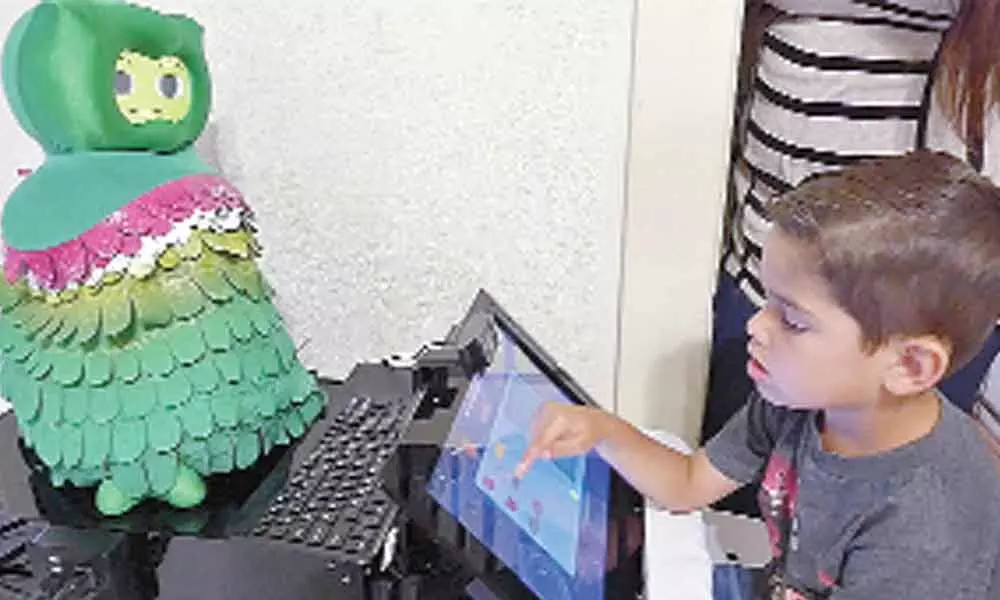Live
- MUDA case: K'taka Lokayukta gets complaint against JD(S) MLA GT Deve Gowda
- ICC Champions Trophy 2025 tour finishes Australian leg
- Japan reports record-high flu cases since 1999
- Central Parliamentary Committee Inspects Polavaram Project Progress
- Anantha Lakshmi Int’l School celebrates Sankranti
- Mukkoti Ekadasi observed with religious fervour
- Officials instructed to solve land issues at once
- Alyssa Healy ready to keep wickets for Australia in Ashes series opener
- Illegal sand mining intensifies along Tungabhadra river
- Rain lashes part of Rajasthan, more in store today
Just In
Special personalised robots may help kids with autism learn


"If you think of a real learning environment, the teacher is going to learn things about the child, and the child will learn things from them. It's a bidirectional process and that doesn't happen with current robotic systems"
Researchers, including those of Indian-origin, have developed personalised learning robots for children with autism, and have estimated the infants' interest in engaging with them using machine learning, an advance that may lead to better home care for kids with the developmental disorder.
The scientists from the University of Southern California in the US placed a socially assistive robot, named Kiwi, in the homes of 17 children with autism between the ages of three and seven for one month. According to their study, published in the journal Science Robotics, the bots personalised their instruction and feedback to each child's unique learning patterns during the interventions.
After the study was completed, the researchers assessed the participants' engagement, and found that the robot could autonomously detect whether or not the child was engaged with 90 per cent accuracy. "Current robotic systems are very rigid," said study lead author Shomik Jain from the University of Southern California.
"If you think of a real learning environment, the teacher is going to learn things about the child, and the child will learn things from them. It's a bidirectional process and that doesn't happen with current robotic systems," Jain said.
In the new study, the scientists attempted to make robots smarter by understanding the child's behaviour and responding to it in real-time. "Human therapists are crucial, but they may not always be available or affordable for families.
That's where socially assistive robots like this come in," said study co-author Kartik Mahajan. In the study, the scientists said, the children played space-themed math games on a tablet with feedback from Kiwi -- a 2-foot tall robot dressed like a green feathered bird.
Kiwi's feedback to the children, and the games' difficulty were personalised in real-time according to each child's unique learning patterns, they added. The study noted that Kiwi's algorithms monitored the child's performance on the math games. If a child answered correctly, the scientists said, Kiwi would say something like, "Good job!".
If the children got a question wrong, Kiwi might give them some helpful tips to solve the problem, and adjust the difficulty and feedback in future games, the researchers added. "If you have no idea what the child's ability level is, you just throw a bunch of varying problems at them and it's not good for their engagement or learning," Jain said.
"But if the robot is able to find an appropriate level of difficulty for the problems, then that can really enhance the learning experience," he added. According to the researchers, Autism is the ultimate frontier for robotic personalisation.
"Because as anyone who knows about autism will tell you, every individual has a constellation of symptoms and different severities of each symptom," said another study co-author Maja J. Mataric.
"Normal AI approaches fail with autism. AI methods require a lot of similar data and that just isn't possible with autism, where heterogeneity reigns," Mataric said. The researchers said they tackled this problem using their analysis of the children's engagement after the intervention.
They developed computer models of engagement by combining many types of data such as the children's eye gaze and head pose, audio pitch and frequency, and performance on the task. "This experiment was right in the centre of their learning experience.

© 2025 Hyderabad Media House Limited/The Hans India. All rights reserved. Powered by hocalwire.com






